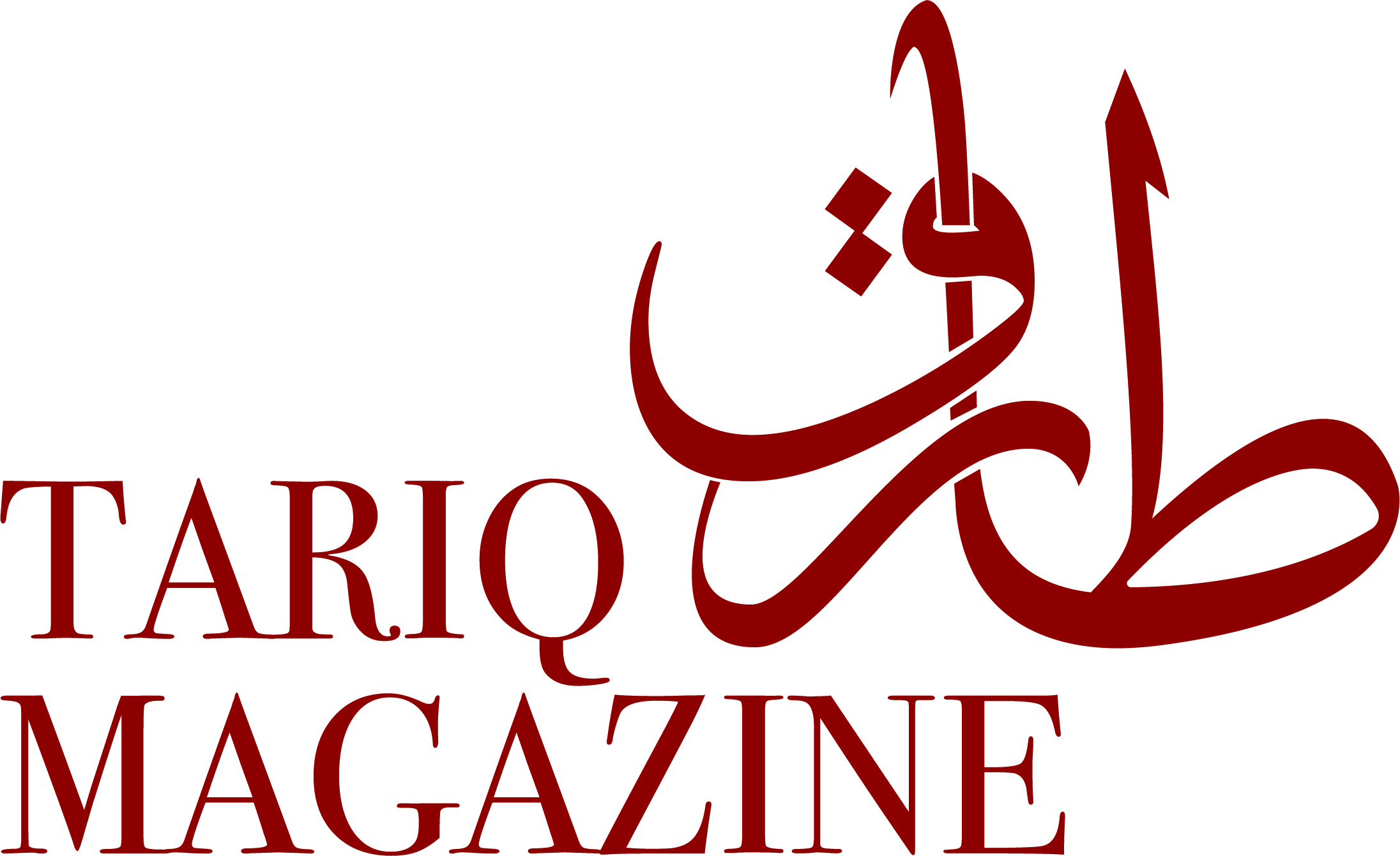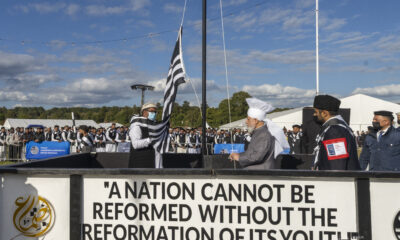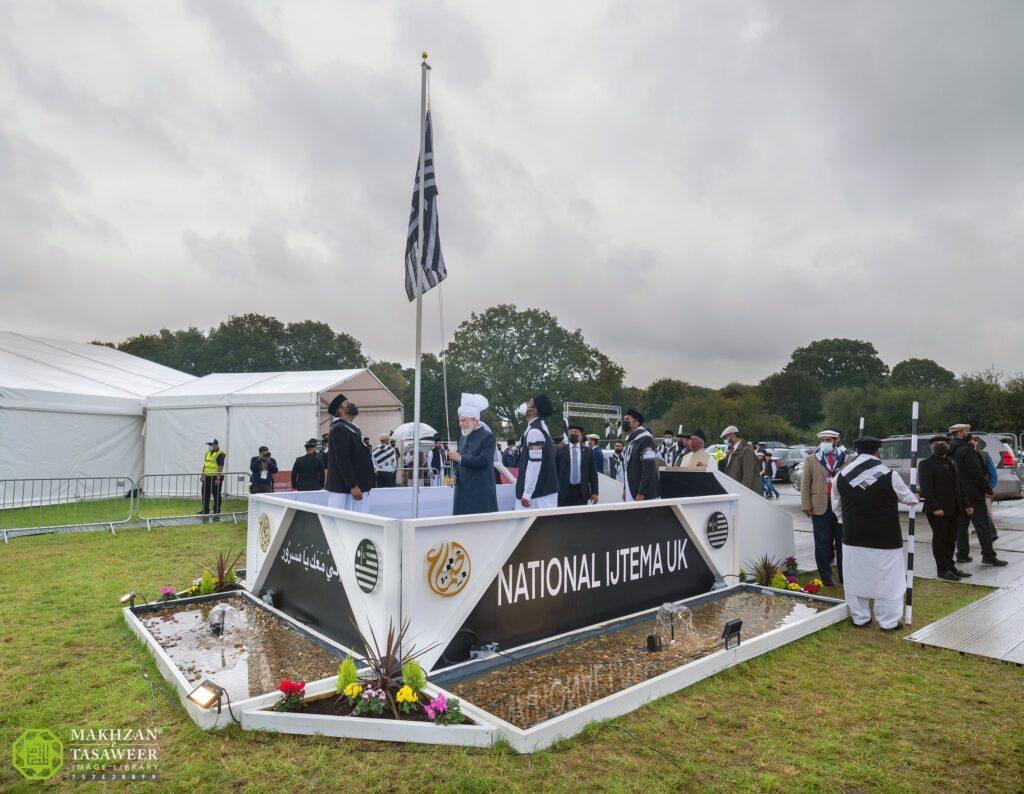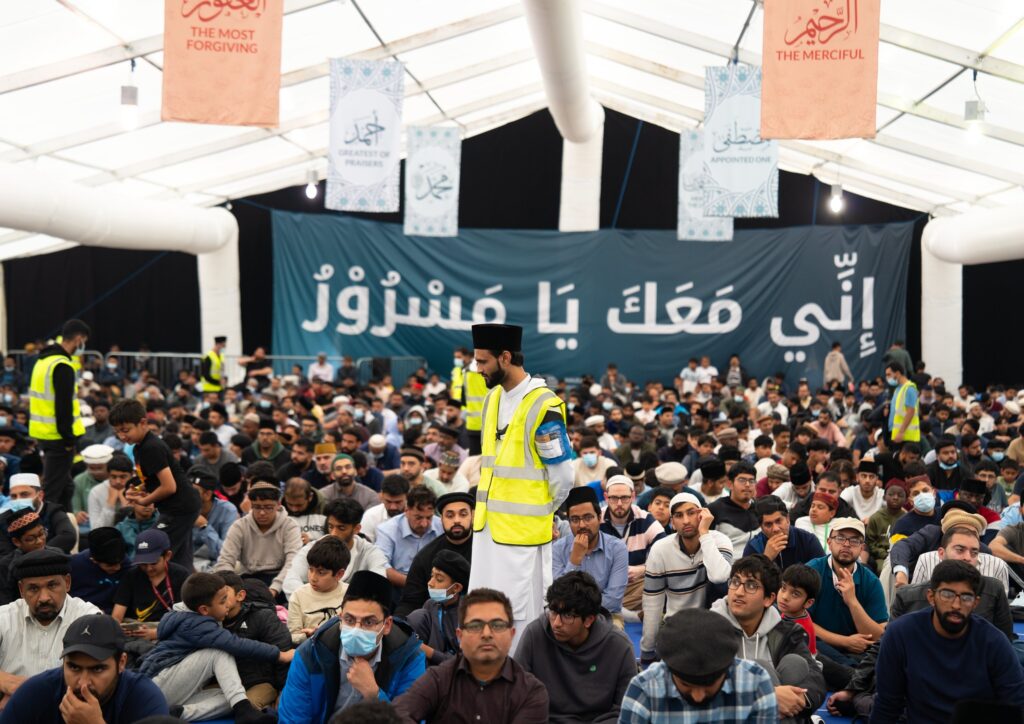Articles
Zikr-i-Ilahi & the Tahajjud Prayer
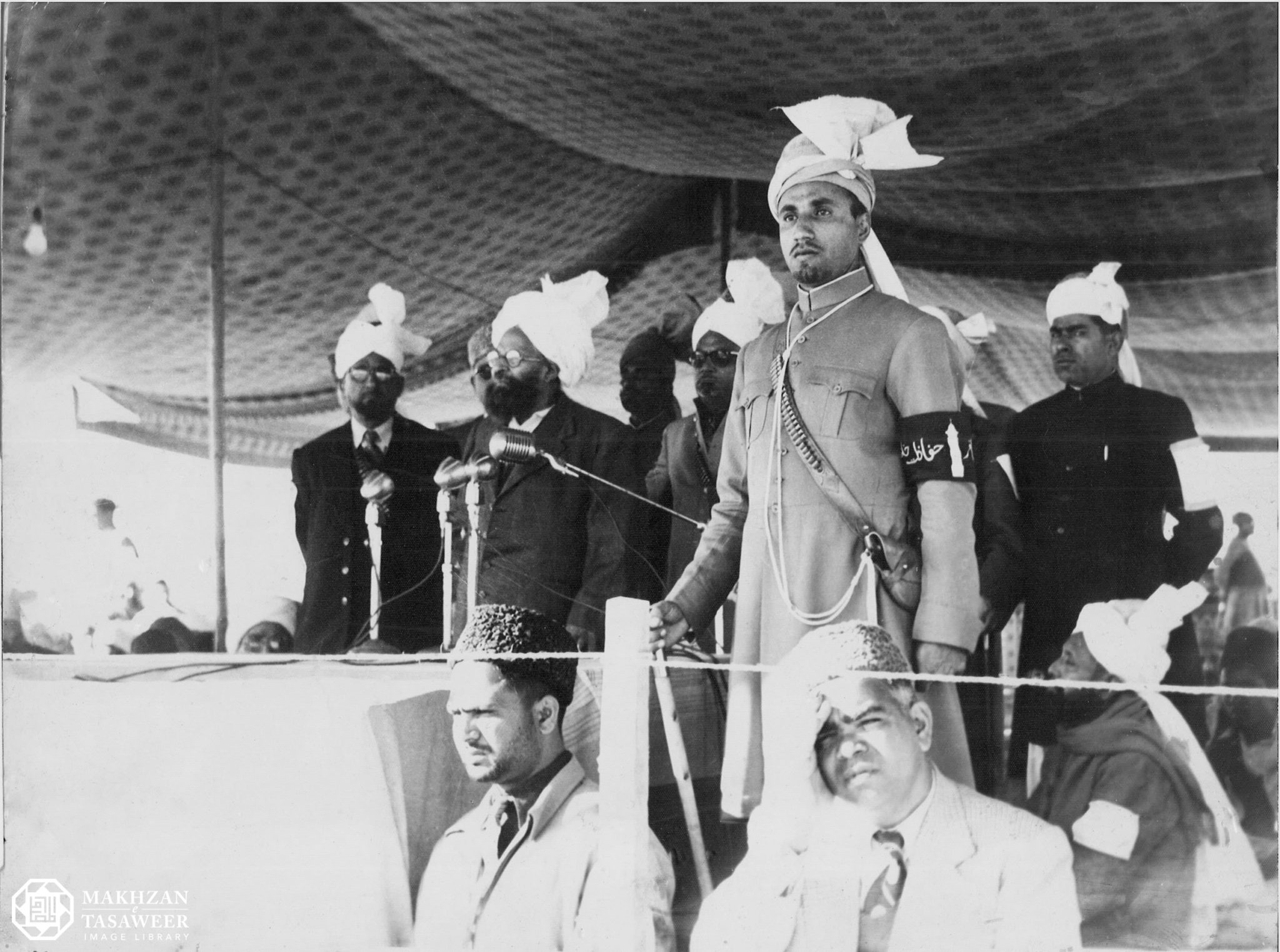
The world was a very different place 104 years ago. By 28th December 1916, the Great War had entered its 884th day. The Ottoman Empire’s power was fading as it had to contend with the Arab revolt, which saw the city of Mecca attacked and overthrown, while Medina was placed under a siege that would last for over two and a half years! And all of this was against the backdrop of World War I.
Like the rest of the world, ordinary folk thousands of miles away in Great Britain had to contend with the harsh reality of food shortages while the social elite mourned the death of famous Austrian composer Eduard Strauss.
With the world in turmoil, a young Hazrat Mirza Bashiruddin Mahmoud Ahmadra entered his second year as the second Caliph (Khalifatul-Masih) to the Promised Messiah, Hazrat Mirza Ghulam Ahmadas (d. 1908). At just 25 years of age, on 28th December 1916, Hazrat Khalifatul Masih IIra used the community’s annual gathering (Jalsa Salana) as an opportunity to direct the world’s attention towards the remembrance of Almighty Allah, the one and true means by which the world could realise a lasting peace.
This speech and the profound effect that it had, and continues to have, on a great many people was recently highlighted by Hazrat Khalifatul-Masih Vaba in a Friday Sermon (19th February 2021). In his sermon, Huzooraba made reference to the methods by which one can remember Almighty Allah as outlined by Hazrat Khalifatul Masih IIra. One of these was the central importance of praying Tahajjud, the early-morning voluntary prayer.
In his speech, which would later be published in book form in multiple languages, Hazrat Khalifatul Masih IIra beautifully set out thirteen tips for how a person can discipline himself / herself to the degree that they can perform the Tahajjud prayer with great sincerity and consistency. These points have been reproduced below for our benefit.
How to Get Up at Night for Tahajjud
One way—not very useful in my opinion—is to use the alarm clock. It creates dependency and fails to produce the resolute will. If you go to sleep having resolved to get up for Tahajjud, you will be in a state of worship all night. Being determined, you will then get up. Those depending on the alarm clock, but lacking determination, will often shut the alarm clock to go back to sleep. When they do get up, they generally feel sleepy in Prayers. Their dependency prevents them from full wakefulness and alertness. However, under certain circumstances the alarm clock may be used by beginners or others.
There are thirteen methods that can assist [one] in getting up at night. Anyone who sincerely tries them will, God willing, take benefit. There may be difficulties in the beginning, but in the end these methods will prove useful. I have derived these methods from the Holy Qur’an and Hadith. It is by Allah’s Grace that these points, which remained hidden from others, have been manifested to me. To save time, I will only give my conclusions without quoting the references.
1. It is a law of nature that everything reverts to its original state if similar circumstances reappear. Often, in old age, a person suffers from his childhood diseases. The same happens to birds and trees. This law can be helpful in cultivating the habit of getting up during the night. Perform Zikr for a while after Isha The more Zikr you perform, the earlier you will get up for Zikr before the morning.
2. Do not talk to anybody after Isha Although sometimes the Holy Prophetsa continued his conversation after Isha, as a general rule he forbade it. There are two reasons: (a) if you start talking, you will sleep late and will not be able to get up early in the morning; and (b) if the conversation concerns things other than faith, your attention will be diverted. You should go to sleep while thinking of your faith; you will get up with the same thoughts. It is not forbidden to carry out office work or other important assignments after Isha. But in that case, it is better to spend some time in Zikr before going to sleep.
3. Perform Wudu (ablution) before going to bed, even if you are already in a state of ablution. It affects the heart and creates a special kind of freshness. If you go to sleep in that state of freshness, you will get up in the same condition. This is a common observation. Someone smiling at bedtime is generally smiling when he gets up; one who is crying, will wake up crying. With ablution you will be fresh at the time of sleep and fresh when you wake up. It will also help you in getting up.
4. Recite some Zikr before falling asleep; this will cause you to wake up again for Zikr during the night. The Holy Prophetsa used to perform Zikr in the following manner before going to sleep: He recited Ayatul–Kursi (verse 2:256) and the last three chapters of the Zikr — the Holy Qur’an; he then gently blew upon his hands and lightly passed them over his body three times. Then he turned towards his right and said:
اَللّٰهُمَّ اَسْلَمْتُ نَفْسِيْ اِلَيْكَ وَوَجَّهْتُ وَجْهِيْ اِلَيْكَ وَفَوَّضْتُ اَمْرِيْ اِلَيْكَ رَغْبَةً وَّرَهْبَةً اِلَيْكَ لَا مَلْجَأَ وَلَا مَنْجَأَ مِنْكَ اِلَّا إِلَيْكَ اَللّٰهُمَّ اٰمَنْتُ بِكِتَابِكَ الَّذِي اَنْزَ لْتَ وَنَبِيِّكَ الَّذِيْ اَرْسَلْتَ
Allahumma inni aslamto nafsi ilayk. Wa wajjahtu waj hi ilayk. Wa fawwadtu amri ilayk raghbatan wa rahbatan ilayk. La malja’a wa la manja’a minka illa ilayk. Allahumma aamanto bikitabikal-ladhi anzalta wa nabiyyikal-ladhi arsalta.
O Allah, I put myself in Thy protection, and turn my face towards Thee and assign all my affairs to Thee, with complete inclination and fear of Thee. There is no refuge or protection from Thee except towards Thyself. I believe in Thy Book, which Thou hast revealed, and Thy Prophet that Thou hast sent.
All believers should perform this Zikr and then continue with another form of Zikr until sleep takes over. An important recitation during this period is:
سُبْحَانَ اللّٰهِ وَ بِحَمْدِهٖ سُبْحَانَ اللّٰهِ الْعَظِيمِ
Subhan Allahi wa bi Hamdihi, Subhan Allahil-Azeem
Holy is Allah, with His Praise;
Holy is Allah, the Greatest.
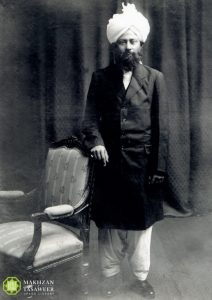
The condition in which a person goes to sleep stays with him all night. If someone sleeps while performing Tasbeeh (Glorification of God) and Tahmeed (Praise of God) he will remain in that spiritual state all night. It is a common observation that ladies or children, who are disturbed or are in pain at bedtime cry when they turn over onto their sides during sleep. Similarly, if someone goes to sleep reciting Tasbeeh, he will recite Tasbeeh when he will turn his side. God Almighty says:
تَتَجَافٰی جُنُوۡبُہُمۡ عَنِ الۡمَضَاجِعِ یَدۡعُوۡنَ رَبَّہُمۡ خَوۡفًا وَّ طَمَعًا ۫ وَّ مِمَّا رَزَقۡنٰہُمۡ یُنۡفِقُوۡنَ
Their sides keep away from their beds; and they call on their Lord in fear and hope, and spend out of what We have bestowed on them. (32:17)
To a casual observer, it may not appear that Muslims keep away from their beds. The Holy Prophetsa went to sleep and so do all the Muslims. But in truth their sleep is not sleep; it is a form of Tasbeeh. They appear to be sleeping, but in reality they are not. Their sides keep away from their beds; they are busy in the remembrance of their Lord.
5. Resolve firmly at bedtime to get up for Tahajjud. God Almighty has given man the power to make his mind obey his will. Philosophers have accepted this principle. Decide firmly that you will get up for Tahajjud. While your body sleeps, your mind will be alert [and] it will wake you up exactly at the desired time.
6. The sixth method is only for those who are particularly strong in faith. Instead of performing Witr (three Raka’at prescribed as essential) after Isha, leave Witr for Tahajjud In general, people are regular in performing the obligatory worship, but show slackness in the voluntary. The Witr are Wajib—[meaning] an essential act of worship, not obligatory but more important than the voluntary [prayer]. When a Wajib is combined with the Nawafil, it would strengthen one’s resolve to observe both. The soul will not rest until the Wajib has been observed. So, the Nawafil will also be observed. One who has already performed Witr may not get up for Tahajjud, even if he is awake. His soul will feel at ease. But if the Witr are still due, the soul will be restless and will awaken him. Only the strong in faith should practice this method; the weak ones may deprive themselves even of the Witr by doing so.
7. The seventh method is also for those who have excelled in spirituality. They should start offering Nawafil after Isha Prayer and continue until they begin to doze off in Prayers and are overpowered by sleep. Even though the total amount of their sleep will be reduced, they will find themselves awake at the time of Tahajjud. This method is an exercise for the spirit.
8. The eighth method has been practiced by many Sufis. I have not felt the need for it myself; but it is beneficial. If you get into the habit of oversleeping, then change the soft bed to a hard one.
9. Take dinner several hours before going to bed. Eat before Maghrib Prayer or immediately after it. Sometimes the spirit is active, but the body is not. The body acts like a yoke: if the yoke is too heavy, it strangles the spirit. The stomach should not be full at bedtime. It has an adverse affect upon the heart and makes a man lazy.
10. Do not go to bed unclean. Angels associate with those who are clean; they do not approach the unclean. Once, the Holy Prophetsa was offered something with a strong odor. He did not eat it but permitted his Companions to do so. He explained to them that the angels, who visit him frequently, did not like such odors. Angels abhor filth. Once Hadhrat Khalifatul-Masih Ira went to bed without washing his hands after dinner. He saw a dream in which his elder brother wanted to present him the Holy Qur’an, but when Hadhrat Khalifatul-Masih Ira was about to touch it, his brother withdrew it and said, “Do not touch the Holy Qur’an; your hands are not clean.” Physical cleanliness affects purity of the heart. Those who are clean will have the help of angels to get up; the unclean will not be approached by them. So, keep your bodies clean.
11. The bed should be clean. Many people ignore this matter. Remember that spirituality is directly influenced by cleanliness of the bed. Take special care in this respect.
12. Husband and wife should avoid going to sleep in the same bed. Amongst ordinary Muslims, this habit can harm spirituality, but it does not affect the spiritually advanced. The Holy Prophetsa slept in the same bed with his wives. He possessed a lofty spiritual status and his spirituality could never be compromised. Ordinary Muslims should be careful. A carnal passion adversely affects spirituality. That is why Islam teaches:
کُلُوۡا وَ اشۡرَبُوۡا وَ لَا تُسۡرِفُوۡا
…eat and drink but exceed not the bounds… (7:32)
Why does Islam prohibit us from exceeding the limits? Because it harms spirituality. People with self-control will not suffer by sleeping together, but ordinary Muslims may find that it keeps their minds inclined towards passion. This hurts spirituality and prevents them from getting up.
13. The last method is particularly superior. It helps in getting one up for Tahajjud and saves one from many sins and weaknesses. Before retiring for sleep, ponder over whether you have any malice or harbour any rancour or prejudices against anyone. If so, remove it. The purification achieved by this exercise will enable you to get up for Tahajjud.
The heart should be totally clean at bedtime. Anybody who considers such thought to be of some worth, should remind himself that he may be free to indulge in them during the day; but he has no need for them at night. After all, he is not going to fight anybody during the night.
Once rooted out, such thoughts will generally not recur. Even if they do, their damage will not be particularly serious. The result of a thing depends on how long it has been influenced by something else. If you wipe something with a sponge, it will be moist. But if you soak the sponge for a long time, it will be drenched. Thoughts that linger and are repeated in your mind all night would overpower your heart.
Such thoughts cannot do much harm during the day because the mind is absorbed in other activities. But during the night, the mind is free to be influenced. Eliminate all bad thoughts against others that occur at bedtime, lest they become rooted. Eradicating them will not then prove difficult. Moreover, should you breathe your last during the night; you will miss the opportunity of asking forgiveness for this sin.
Once you eliminate the rancour, you will be free from it permanently. When you purify yourself at night, you will certainly be blessed with the opportunity of getting up for Tahajjud.
Articles
A Spiritual & Moral Transformation
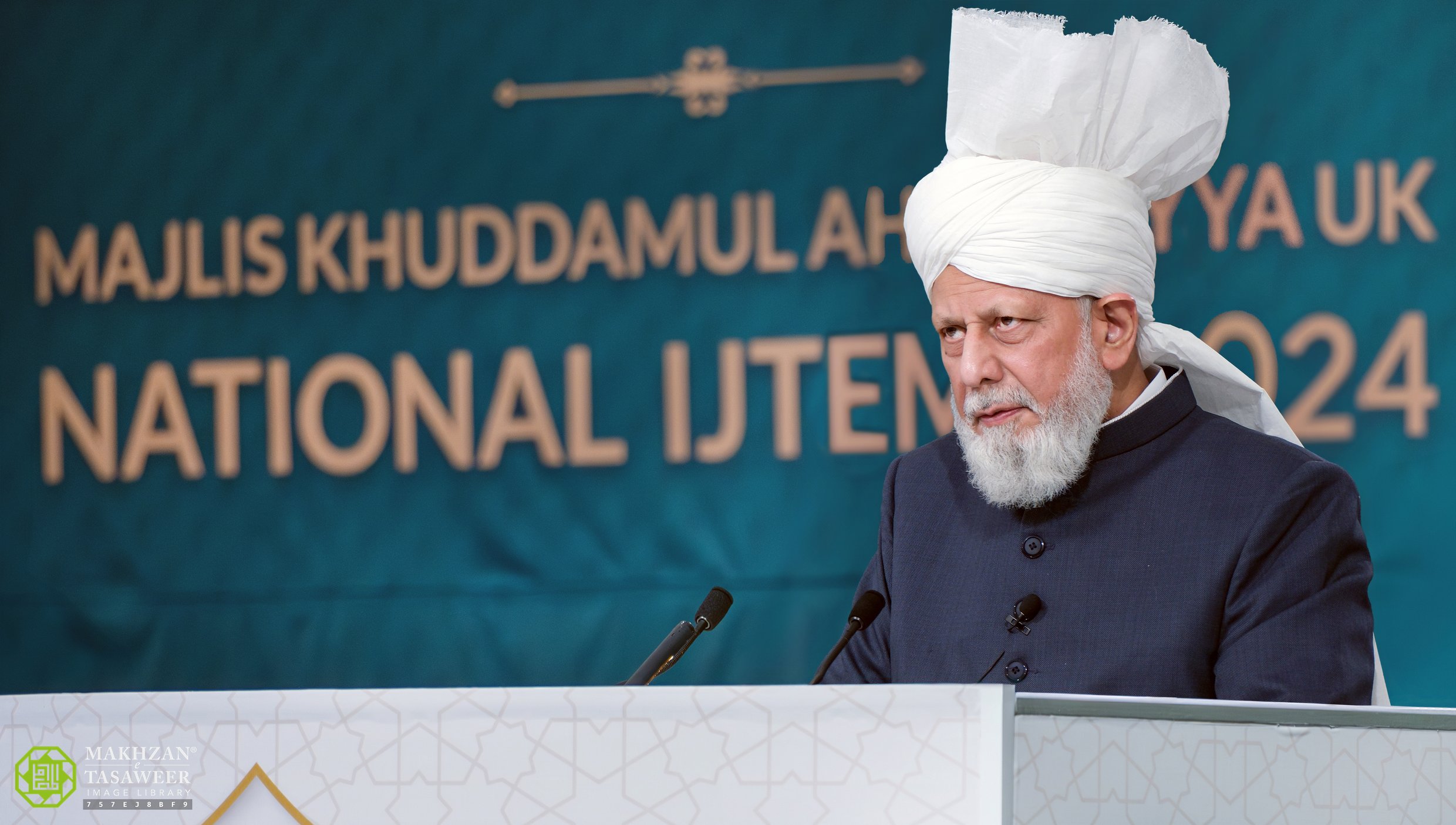
On 22nd September 2024, Hazrat Mirza Masroor Ahmad(aa) delivered the keynote address at the Ahmadiyya Muslim Youth Association’s gathering in Kingsley, Hampshire, highlighting the responsibilities on the shoulders of the attendees.
We present the official transcript of this address. After reciting Tashahhud, Ta`awwuz and Surah al-Fatihah, Hazrat Khalifatul Masih V(aa) said:
‘By the grace of Allah, once again, you have had the opportunity to hold and participate in the National Ijtema of Majlis Khuddamul Ahmadiyya, an Ijtema dedicated to young Ahmadi men and boys.
Furthermore, the Holy Prophet(sa) has stated that resorting to falsehood is a mark of a hypocrite. The Holy Prophet(sa) said that when a hypocrite speaks, he lies; when he makes a deal, he violates its terms; when he makes a promise, he breaks it; and when involved in a dispute, bereft of reason and logic, a hypocrite resorts to cursing and abusing the other party. No Ahmadi man, woman or child should ever tolerate the thought of being classed amongst the idolaters or hypocrites. As I have said, there should not even be a hint of deception in our words or deeds; rather, others should testify that Ahmadi youth speak truth, live truth and embody truth at all times. People should have complete confidence that if they deal with an Ahmadi, they will fulfil the terms of their agreement with integrity, even if it leads to a loss.
Further, if you ever find yourself in a dispute or argument, never lower your moral standards by abusing or cursing the other person; rather, use logic and evidence to support and convey your point. Hold fast to the truth, even if it may cause you short-term loss. Always remember that plotting or scheming can never lead to anything good or prove a means of benefit to us. One day, we must all depart this world, and so we must spend whatever time we have engaged in those acts that are pleasing to Allah the Almighty and abide by the perfect teaching He has bestowed to us through the Holy Prophet(sa).
Similarly, Ahmadi parents must refrain from all forms of falsehood within their homes, even what they might consider a harmless joke. As parents, you must nurture the seeds of truthfulness in your children. Otherwise, you cannot expect your children to speak truthfully and to understand its value. Similarly, always keep your promises to your children. Do not make a promise if you are unsure if you can fulfil it.
In his writings and various discourses, the Promised Messiah (as) has also repeatedly condemned falsehood in the strongest possible terms. On one occasion, the Promised Messiah (as) states, “In reality, until a person abandons falsehood, he cannot become pure. Worthless, worldly people believe that they cannot survive without lies. However, this is a reprehensible belief.”
Here, the Promised Messiah(as) condemns and utterly rejects the belief that a person must engage in falsehood to succeed. The Promised Messiah(as) further said, “If one cannot survive with truth, then falsehood certainly cannot sustain a person either. It is deeply regretful that these wretched people do not give God the value He deserves.”
He says, “They do not know that without the grace and mercy of God Almighty, a person cannot survive.”
The Promised Messiah(as) continued, “Yet, they consider the filth of falsehood to be their god and the means of resolving their difficulties. This is precisely why God Almighty has tied falsehood to idol worship in the Holy Quran. Know for certain that we cannot take even a single step, rather not even a single breath, without the grace of God.” (Malfuzat Vol. 2, p. 82)
The Promised Messiah(as) states that every single breath we take is due only to the grace of God Almighty and that a person’s scheming, plotting or lying can never lead to success. By departing from the truth, all we achieve is to depart from the protection and mercy of God Almighty. Conversely, if we eliminate falsehood from society, the many conflicts, disputes, and grievances that threaten the world’s peace and prosperity will find no oxygen to burn.
If truth and justice are prized above all else, the fear of facing the consequences of their actions would deter nations from perpetrating warfare, evil, and injustice. At an individual level, people would naturally try to free themselves of their vices out of a fear of exposure and having their reputation tarnished. This is why the Holy Prophet(sa) instructed one Companion that if he genuinely desired to rid himself of his many vices, he should pledge never again to tell a lie. Consequently, if we instil fidelity to the truth within ourselves, other virtues and qualities will automatically develop in us and become part of our daily lives.
Therefore, I reiterate that all Jama’at members, especially Khuddam and Atfal, should collectively pledge to eradicate all traces of dishonesty from their lives. Indeed, Ahmadi youth and children should, as individuals and collectively, launch a campaign and movement to uphold truthfulness and honesty, reject falsehood and embrace truth. May it be that all people testify to the fact that Ahmadi youth are those who never utter a false word.
Now, before concluding, I also wish to remind you of the crucial importance of obedience to Khilafat. If your pledge you have all vowed to abide by and fully obey any ma’ruf decision made by the Khalifah of the time, What is a ma’ruf decision? Simply, it is to convey the commands of Allah the Almighty and His noble Messenger(sa) because the Khalifah of the time will never give any instruction or statement contrary to the commands of Allah the Almighty or the Holy Prophet(sa). Accordingly, you must continually assess if you are living up to your pledge of obedience.
Amongst the ma’ruf decisions of the Khalifah of the time, instructing Ahmadis to observe Salat at the prescribed times and fulfil the rights of the worship of God Almighty is of primary importance. Thus, I repeatedly instruct Ahmadis to focus on offering namaz with concentration and humility at the appointed times. Regrettably, the attendance at our mosques and Salat centres is not as high as it should be, even though many Khuddam and Atfal live near a mosque or centre and can easily come for namaz.
Similarly, many do not wake up to offer the Fajr prayer at the correct time. Each Khadim personally, and Majlis Khuddamul Ahmadiyya as an organisation, should pay attention to this. Unquestionably, when you strive to fulfil the rights of Allah, your love for Him will naturally lead you to fulfil the rights of His creation. So, if you are diligent in the worship of Allah the Almighty, you will come to possess and exhibit the highest morals and will never be the cause of disorder or division in society. Instead, you will play a significant and positive role in bringing people together under the banner of peace, love and mutual respect.
Similarly, I wish to draw your attention to the fact that after namaz, a short dars is normally offered in our mosques, and instead of leaving quickly, you should listen carefully to them. This will ensure that the commands of Allah the Almighty and His Messenger(sa) consistently reach your ear and will deepen your understanding of Islamic teachings and beliefs.
Now, as the Ijtema draws to a close and you return to your homes, I urge you to pay close attention to what I have said today. Reflect especially upon the hadith in which the Holy Prophet(sa) taught that shunning falsehood was the means of freeing yourself from other vices and sinful activities. Similarly, pay heed to the blessed words of the Promised Messiah(as) advising his followers to remain engaged in a constant spiritual jihad against falsehood.
Always remember that a community or nation whose members manifest truth and integrity is destined for great success. Hence, if members of Majlis Khuddamul Ahmadiyya and Atfalul Ahmadiyya hold fast to truth, there is no doubt that a great and everlasting spiritual victory is destined for us. Undoubtedly, if Ahmadis manifest Islam’s true teachings, individually and collectively, then no matter what our opponents throw at us, no matter how they seek to destroy or persecute us, their every effort will be futile and denied. They will never be able to cause us any harm, as together, we will raise aloft a shield of truth that can never be penetrated, Insha’Allah.
Always remember that our purpose extends far beyond mere words. We will not fulfil our objectives just by reciting poems or slogans; rather, our prosperity lies in ensuring that our deeds perfectly mirror the teachings of Islam.
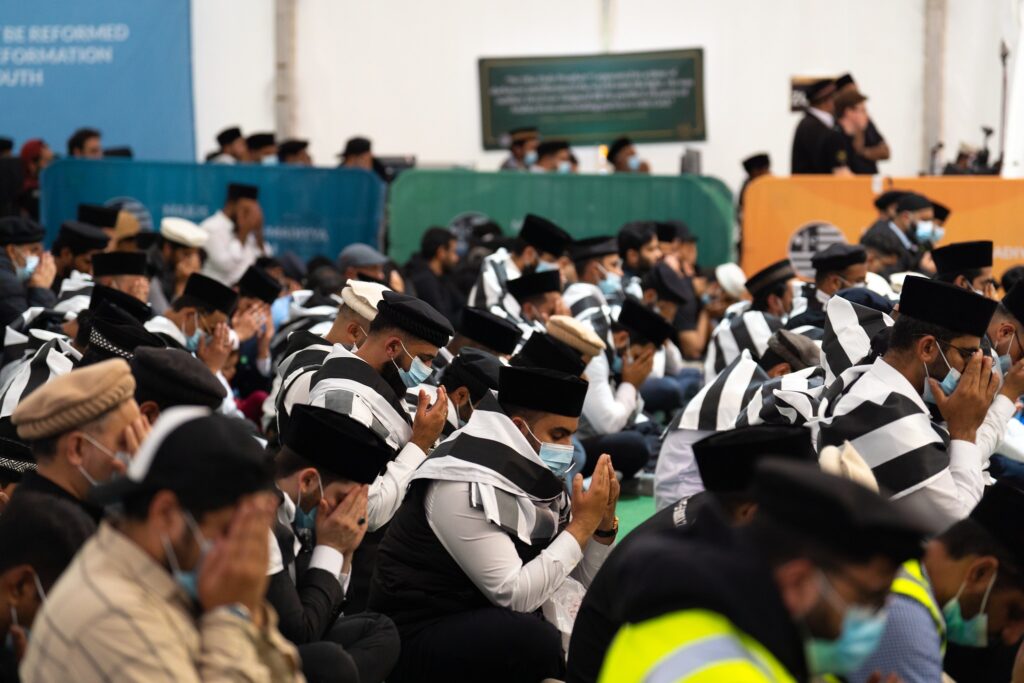
And so, at the end, I pray that may every Khadim and Tifl leave this Ijtema with a fervent and burning desire to elevate their worship, strengthen their morals and embody truth in every facet of their lives. May Allah the Almighty enable all of us to do so – Ameen. JazakAllah.
Now, join me in silent prayer.
Articles
Al-Furqan FC: A formidable force to be reckoned with
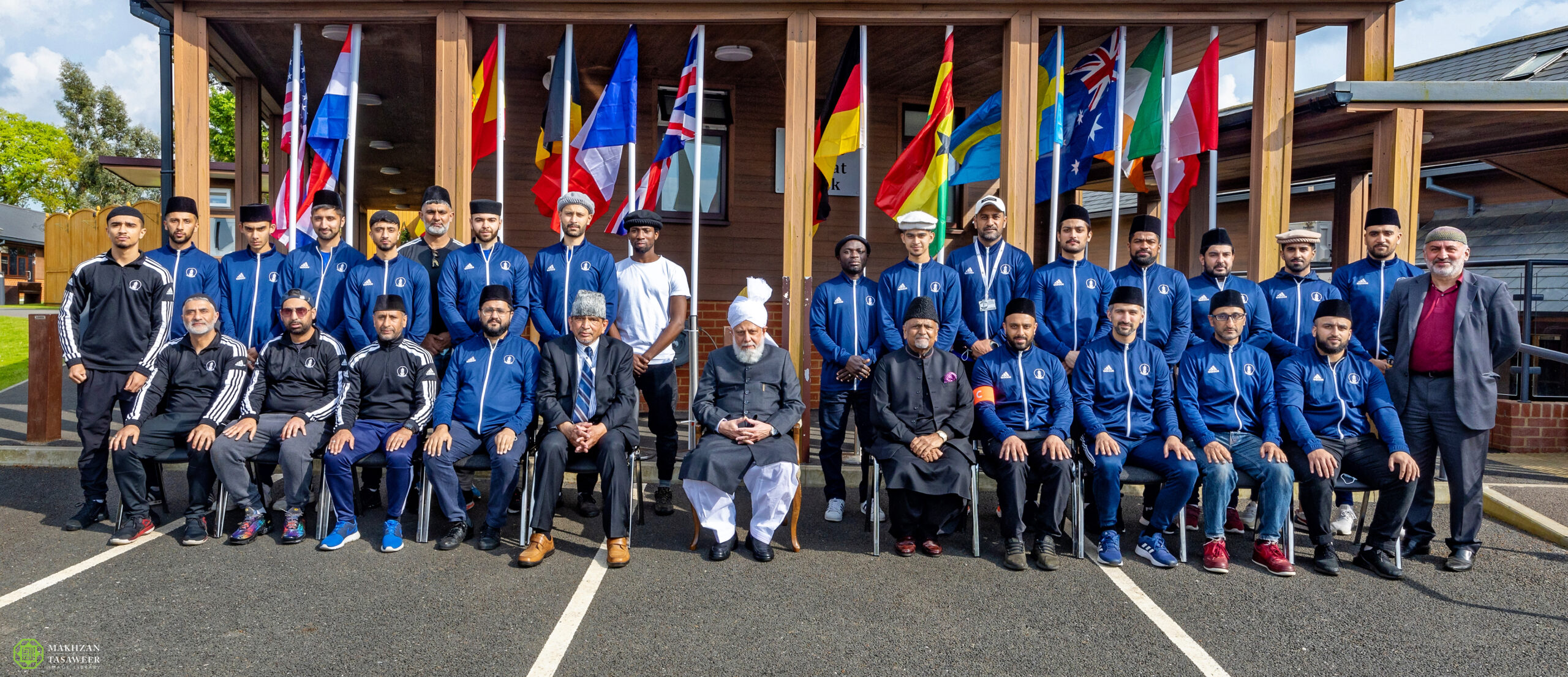
The title to this article should actually read, ‘Al-Furqan FC: A formidable force to be reckoned with, unless of course, you are ze Germans’. However, due to publisher guidelines we had to settle for the former. Let me explain.
Over the weekend of the 12th May 2023, the inaugural International Football Tournament organized by Majlis-E-Sehet was held in the UK. As the host country, the UK registers several teams and in previous years at similar tournaments have submitted a ‘UK A’ and ‘UK B’ team alongside others including, Fazl-e-Umar (formed of Jamaat workers), Jamia UK, and Spain. Yes, Spain. The majority (if not all) of the Spanish team was made up of British players. I’m putting it down to potential ‘ex-pat’ participation or issues with getting travel visas since Brexit*.
Due to what some people consider selection bias and the north-south divide**, this year’s tournament organizers approved the formation of a UK South and UK North teams instead of A and B. Quickly, some people attached a somewhat derogatory label of A and B to the South and North team which may have upset lesser individuals, but couldn’t shake the South team***. Foreseeing this, the organisers promoted both teams to rename and avoid connotations to the regional differences.
*a calamity for the British people in the UK and overseas.
**a variation of accents and local lexicon.
***DISCLAIMER: Yes, I played for the ‘North’ team this year but have played for the ‘South’ team in the past so I’m sure they won’t mind the jibe. Hopefully.
Shazil Lone – Manager – United Kingdom (previously UK South).
“We wanted to keep UK in the name as we felt without it, it would disregard UK’s history of reaching the European finals twice and winning it back in 2018. We kept it simple and stuck to United Kingdom.”
The UK team kept their name simple, but further north, things were going in a different direction. Head Coach of UK North, Waseem Hussain (or ‘Waz’ as he is lovingly referred to as), was instrumental in the northern outfits name change. After getting to know Waz over the past 3 months, I can confirm that this guy lives and breathes football. He’s the kind of guy you wouldn’t recognise if he wasn’t in a full tracksuit. When speaking to him about why the name change occurred, Waz said:
“When I suggested Al-Furqan, I did so because it was never about just naming a football team. It had to be special and make a difference. Something long lasting. The Furqan Force has always resonated with me as they were few in numbers. Self-funded. Small but tough group. That’s what I wanted our squad to be, an army. It was meant to be. I believe this was the way forward. This was so much bigger than football, it needed that spiritual and historical context. From the organisation sides of things, the management team threw a few names into the hat. Murabbi Sahib was intent on the name having an Arabic and Islamic context. He made the final call – he was the main man and everyone accepted that from bottom to top.”
Conversations with the Murabbi Kurshid Sahib, manager of UK North, confirmed Waz’s vision for the team.
Muhummad Kurshid Sahib – Manager – Al-Furqan FC:
“I loved the name straight away, as a tribute to the Furqan force. The youth should know about the sacrifices they made. A team talk was specifically planned in regards to what it means. To be able to differentiate between right and wrong. After this tournament ends, we will form our own team in a local league and so it will be an avenue for tabligh. As well as this, I felt the tournament would be an avenue to connect the northern boys to Marqaz. That was one of our goals.”
So it began. The UK North team was renamed after the Furqan Force; a volunteer corps established by the Jamaat that fought in Kashmir alongside the Pakistan army during the partition of Pakistan and India. ‘Al-Furqan’ itself derives from the Quran (Chapter 25: Surah Al-Furqan), meaning those who can distinguish between right and wrong.

Al-Furqan’s Team Badge
The team was founded, but now the players had to be selected. A rigorous process of multiple trials held in various corners of the north, followed by weekly squad training (even through Ramadan), meaning players had to travel hundreds if not thousands of miles in the 3-month period to get ready for the tournament. Although it seems far, it was no further than one particular player, Jahja, our 36-year-old semi-professional footballer from Pakistan. A week before the northern trials took place, he had arrived in the UK on asylum due to persecution for being an Ahmadi Muslim in his home country. In fact, he was representing the Pakistan National Football team until they found out about his faith. In our eyes this was a huge loss for Pakistan but a massive gain for Al-Furqan! Alongside him, players from Manchester, Bradford, Birmingham, Leicester, Stoke, Hartlepool, Sheffield and Glasgow made the final squad. Distances stretched, but players united over this unique period of time.
Momentum gained in the build up to the tournament as the squad prepared, but in an unfortunate turn of events, the passing of Manager Kurshid’s father meant he had to leave northern UK for Pakistan. All of a sudden, the progress of the group under the guidance of the manager seemed to be coming to a halt.
“I left camp and went to Pakistan for 2 weeks. I was thinking of stepping back. But then in my mind I thought, if this is jamaat work, how can I say no? This became a personal journey for me. If it was just football, I would have dropped out immediately.”
In the intermediate, Waz would look after things with the help of his assistant coach and son, Amaar Hussain alongside captain Atta Khan and vice-captain Abdul Ghalib. The training continued and increased in intensity as players looked to get match fit. With multiple games being played across each day of the tournament, fitness was paramount to any success. Players were promoted to train multiple times a week together, take part in friendly matches and complete a minimum of 2km run everyday in the fortnight leading up to our first fixture. Upon Manager Kurshid’s return, the squad felt as ready as they could be.
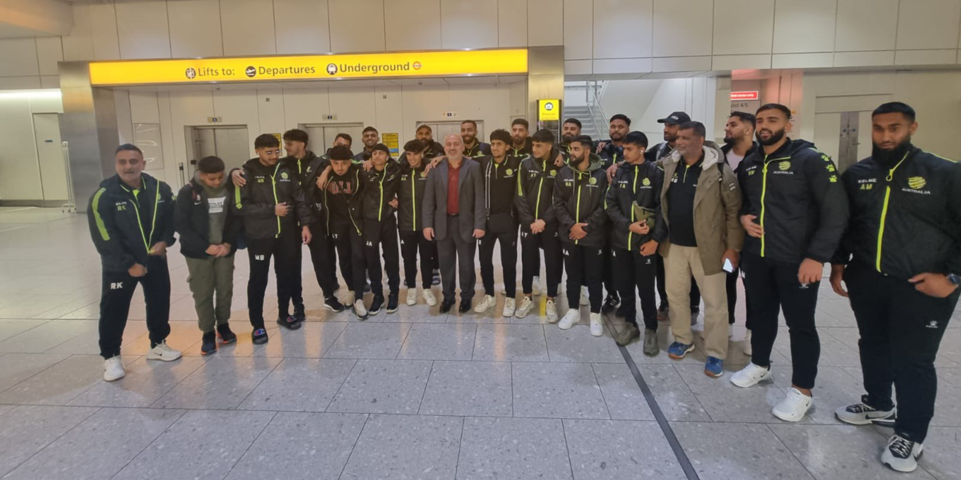
Australia arrive in the UK for the tournament, met by tournament chairman, Nisar Orchard Sahib.
Ismail Ahmad – Central Midfielder and Captain – Team USA
“On arrival, I was shocked by how many teams there were. Previous tournaments have been on a much smaller scale but this was another level. Organisation was really well done. The way this tournament brought so many people from all parts of the world together with key common interests; Jamaat and football.”
At the outset of the tournament, a dinner was hosted at the new Baitul Fatuh complex where teams got to meet one another and eat together. This was the beginning of attaining one of the key purposes of this event, to develop bonds between Ahmadi brothers from far and wide. With teams arriving from as far as the USA, Canada, Australia and across Europe – this truly was an international tournament. The following morning, the group stage games began.
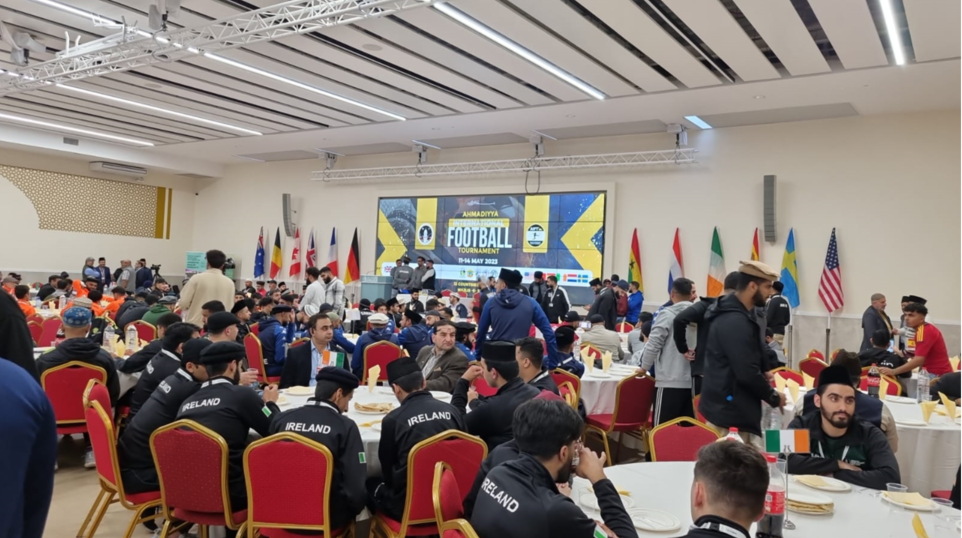
Teams gather for the tournaments opening session in Baitul Fatuh
FLYING START FOR AL-FURQAN
Al-Furqan vs Holland – Group Stage Game 1 – Friday 12th May
Al-Furqan announced themselves on the world stage with a solid performance against the resolute Netherlands. Led by the ‘Flying Dutchman’ Ibrahim Ahmad, Holland dominated the first 10 minutes of the game with the majority of possession and attempts at goal but with little fortune. Steadily, Al-Furqan grew into the game and after having shaken off some early nerves, showed Holland their quality with a quick breakaway play that lead them to a 2-0 lead at halftime. Late into the second half, Holland managed to pull one back through a superb penalty taken by their number 9 but the spark of hope was quickly diminished as Al-Furqan responded with attacking midfielder Rayyan Hussain grabbing a brace before the final whistle.
The final score was 4-1 to Al-Furqan.
AL-FURQAN TEACH JAMIA CANADA A LESSON
Al-Furqan vs Jamia Canada – Group Stage Game 2 – Friday 12th May
The final game of the first day for Al-Furqan was against underdogs Jamia Canada. In their first fixture, they challenged group favorites Canada A, only losing by a goal in a tightly contested match finishing 3-2. Al-Furqan took no chances and played strong starting eleven and soon found out why Jamia had put up such a good fight against their counterparts. Jamia’s central midfielders were quick and tricky, finding pockets of space to run into and doing so with confidence. Alongside this, they had a back four who put everything on the line not to concede. But unfortunately for them, neither of these strengths could stop a sublime freekick by set-piece specialist Jajha from looping over the keeper from 25 yards. The game then opened up and Al-Furqan sent wave after wave of attacks, breaking through the heart of defence to score a second with captain Atta adding another to his tournament tally.
The final score was 2-0 to Al-Furqan.
FURQAN FORCE THEIR WAY INTO THE QUARTER-FINALS
Al-Furqan vs Canada A – Group Stage Game 3 – Saturday 13th May
The match against Canada A was arguably one of the most entertaining matches of the tournament and the biggest threat Al-Furqan had faced so far. With the match taking center stage at the Xcel stadium, a crowd of several hundred spectators took to the stands to cheer on the teams. A chorus of narays echoed around the pitch throughout the match as the ebbs and flows of the game took the audience on a thrilling ride. Some dubious defending (not naming any names but it starts with M and ends in E) led to Canada taking the lead as the left winger beat the offside trap to slot it home. This got the Canadian management team and bench off in a frenzy which only added to the exhilarating atmosphere. Al-Furqan pulled one back with a penalty as our right winger, Bash, was too skillful for the fullback and was taken down in the box. Cool-headed Jajha converted from the spot. At the beginning of the second half, Canada’s striker was fouled on the edge of the box. He then went on to perfectly place the ball into the top corner just out of the reach of goalkeeper Haris. With the wind in their sails, Canada held onto possession, playing the better football out of the two teams, and pushed for a third. Haris was once again called into action on a couple of occasions but Al-Furqan weathered the storm and pushed on the counter. As the intensity of the atmosphere around the ground increased, Al-Furqan did what they could to break down a solid Canadian defense. With not long left in the game, Al-Furqan settled for a corner which was whipped in, and with Canadian bodies doing everything to dampen any attempt at goal, a wayward shot hit the hand of a player in the box, and another penalty was awarded to Al-Furqan. Tempers flared on and off the pitch at the decision but this didn’t hinder Jajha, as once again, he stepped up and hammered it home. A rapturous crowd responded, expecting the last few minutes of the game to be nothing less than end-to-end action – and both teams delivered but to no avail.
Final score, was 2-2.
Oui Win
Al-Furqan vs France – Quarter Final – Saturday 13th May
France’s team included the tournament’s top goal scorer and were a team to watch according to many spectators who had been keeping a close eye on them. Al-Furqan started the game strong, as did France who were keen to prove to people they were not to be underestimated. As the first half ended at 0-0, you couldn’t pick a favourite between the two. However, in the second half, Al-Furqan took it up a gear and showed their quality by taking a hold of the game. Two goals including Atta’s audacious chip on the half volley over the keeper followed by winger Toyyub’s pop from close range that crepe-d into the far corner put the game to bed. Hopefully our paths will croissant again. In the meantime, Al-Furqan had baguette-d themselves a place in the semis. Ok, I’ll stop now. Apologies.
Final score, 2-0 to Al-Furqan
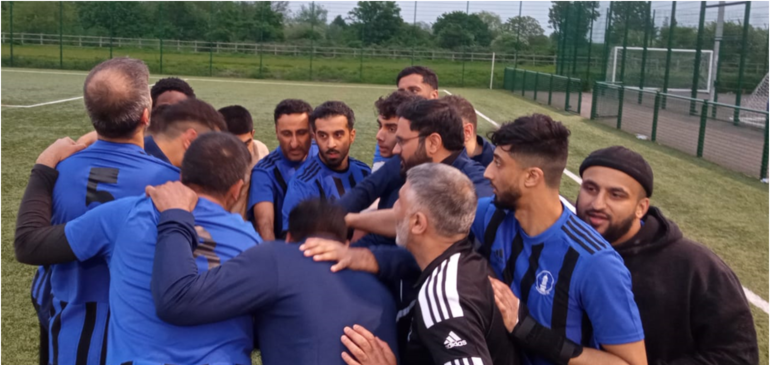
Al-Furqan huddle prior to kick off
Muhummad Ehsan Ahmad – Right Back/Captain – Jamia UK
“This was the first time that Jamia had taken a team to a tournament since corona. The highlight for us was playing Germany A who went onto win. We didn’t get much prep time. We were a small team playing the favourites. We were winning 1-0 and looking on the side-lines we had all of the other teams supporting the underdogs! They scored in the last kick of the game. What a match.”
DEUTSCHLAND DISMANTLE AL-FURQAN
Al-Furqan vs Germany A – Semi-Final – Saturday 13th May
With only a half an hour break between the quarters and semis for Al-Furqan, the players were straight back in at the deep end. This time against the reigning champions. We knew they had been pushed to the brink by Jamia UK in the group stages – which gave us motivation that we could go one further. The magnanimity of the occasion gave Al-Furqan the adrenaline they needed to be the better of the two sides in the first half, playing some high tempo football and creating a couple of chances. With the scores level going into the break, key players and management motivated players with inspiring team talks to get them towards a potential illustrious final against the UK held in Islamabad the following day. However, fatigue had started to set in. Al-Furqan became sluggish and struggled to keep up with the pace of the game. Smelling blood, Germany took advantage and started to play a more fluid and attacking style, finally getting on the scoresheet with 10 minutes to play. Germany added two more before the final whistle as Al-Furqan struggled to break their back line and conjure up anything special to test the German keeper. A flat finish to what had otherwise been an exceptional first tournament for the newly founded team.
Final score, 3-0 to Germany A.
Abdul Lohdi, Attacking Midfielder – Al-Furqan FC
“I was so exhausted in that last game. For most of it I was just thinking… I can’t wait to get into bed.”
Post-game, our despondent team reflected upon their performance and overall weekend. Nothing but positives was to be taken home with the squad, considering how in many people’s opinions, we had overachieved. Nevertheless, as a defeated player, you can’t help but focus on the negatives. Things that could have gone better. No doubt some of the younger players in the squad who were competing in their first tournament, would feel this loss for a while. Some of the senior players in the dressing room told them that it would soon pass – you get used to it. These games come and go and you learn more from a loss than you do from a win. That kind of thing. Who knows how much of that advice they took on board. Either way, they’ll get over it. Especially when we come back and win it next time… InshAllah!
Zafir Malik, Central Defensive Midfielder – Fazl-e-Umar:
“The most memorable take away for me was getting to meet with my Khuddam brothers from all parts of the world. Winning and losing is one aspect of the game, but getting together to compete, or raise slogans, singing Durood and getting the crowd involved, that’s what it’s all about. You can’t put a price on that kind of atmosphere. The battle on the pitch and the love off the pitch. That’s the beauty of tournaments like this one. That’s how Ahmaddiyat works. The only thing that can bring people together like this is Khilafat.”
On exiting the venue, the pick-me-up that everyone needed was announced; Huzoor (aba) would be taking team photos in Islamabad after the final. All of a sudden, the pain of the loss was washed away with this wonderful news!
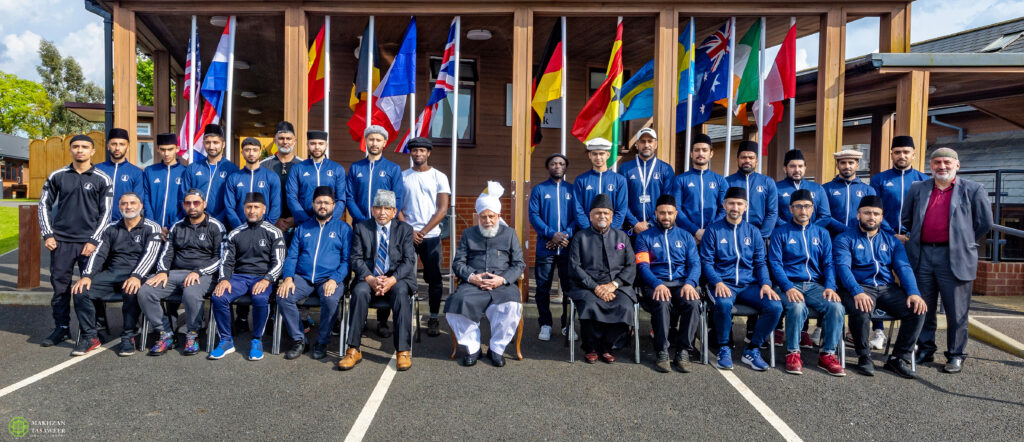
Al-Furqan FC Team Photo with Beloved Huzoor (aba)
Stood there with Huzoor (aba) sat alongside made us all feel like winners. The highs and lows of the weekend were superseded by this brief moment. The click of a lense, a quick Salam and JazakAllah. I’m sure I speak for everyone that was fortunate enough to be beside beloved Huzoor (aba) for their team photos; this was the real trophy.
Once the photo was taken, we were swiftly moved on by amoomi who directed us towards the masjid. We walked slowly, reflecting upon the awe of the moment that had just occurred. Members of the squad scuttled towards Manager Kurshid Sahib who spoke directly to Huzoor (aba) when he arrived.
“What did Huzoor say to you?”, we all gestured in our own ways as the entire squad huddled around him. He went on to eloquently repeat what Huzoor (aba) had said to him, including his own personal request of prayers for his late father.
“Weren’t we lucky to be the first team to have our picture taken! If it wasn’t for the name ‘Al-Furqan’, alphabetically we could have been anywhere on the list!”
If it hadn’t been for the name, we wouldn’t have been the first team stood ready when Huzoor initially arrived. He spoke with us for a slightly longer period of time than others as he walked over to take his seat at the centre of the team. Once again, the name of this team seemed to solidify itself as something that had brought us additional blessings.
Although the majority of us were huddled closely with a feeling of glee illustrated across our faces, near the back of the group was Jajha, tears streaming down his face, completely overcome with emotion. His first time seeing Khalifatul Masih in person, especially considering the journey he had been on to get here was reflected in his eyes. We all gathered around him to share one last hug before departing for the masjid.
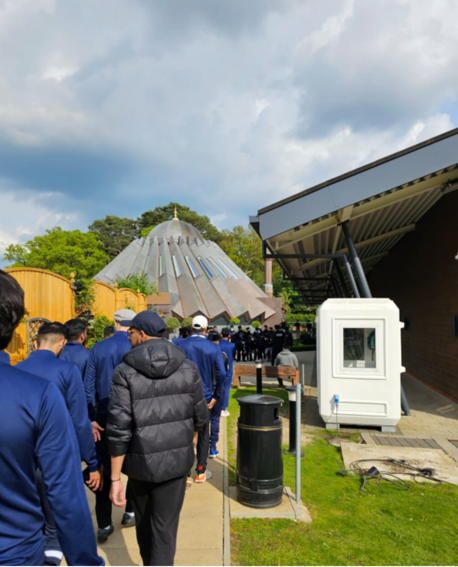
Al-Furqan walk to namaz after having their team photo taken with Huzoor (aba)
There were many unique highlights at this tournament. If I wrote about them all they could easily fill an Al-Hakam newspaper front to back. I guess if I had to pick one, it would be the overhead kick to seal the win for Germany A against Jamia UK in the last second of the game. Or maybe it was Australia’s 40-yard screamer of a freekick against UK in the Quarter finals? But, then again, that did lead to the sudden death penalties where Australia had 4 separate match winning penalties that they missed or had saved by UK’s hero goalkeeper! No. No. Wait. PAAMA Stars walking out to their quarter final singing Durood. Actually, it could have been the pitch invasion after Germany beat UK in penalties (deja vu) in the final. Anyway, regardless of which highlight tips the others for top spot I don’t think any written word would do justice to these moments. You just had to be there.
In loving memory of the late, Maulana Munawwar Ahmad Khursheed Sahib, father of Murabbi Muhummad Kurshid – Manager of Al-Furqan.
“…I told him that I had been appointed as manager of the UK northern team. He said ‘MashAllah, very good.’ with a beaming smile.”
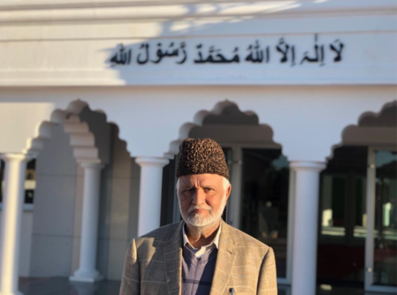
Maulana Munawwar Ahmad Khursheed Sahib
Articles
Kicking Off the Year – Khadim Style
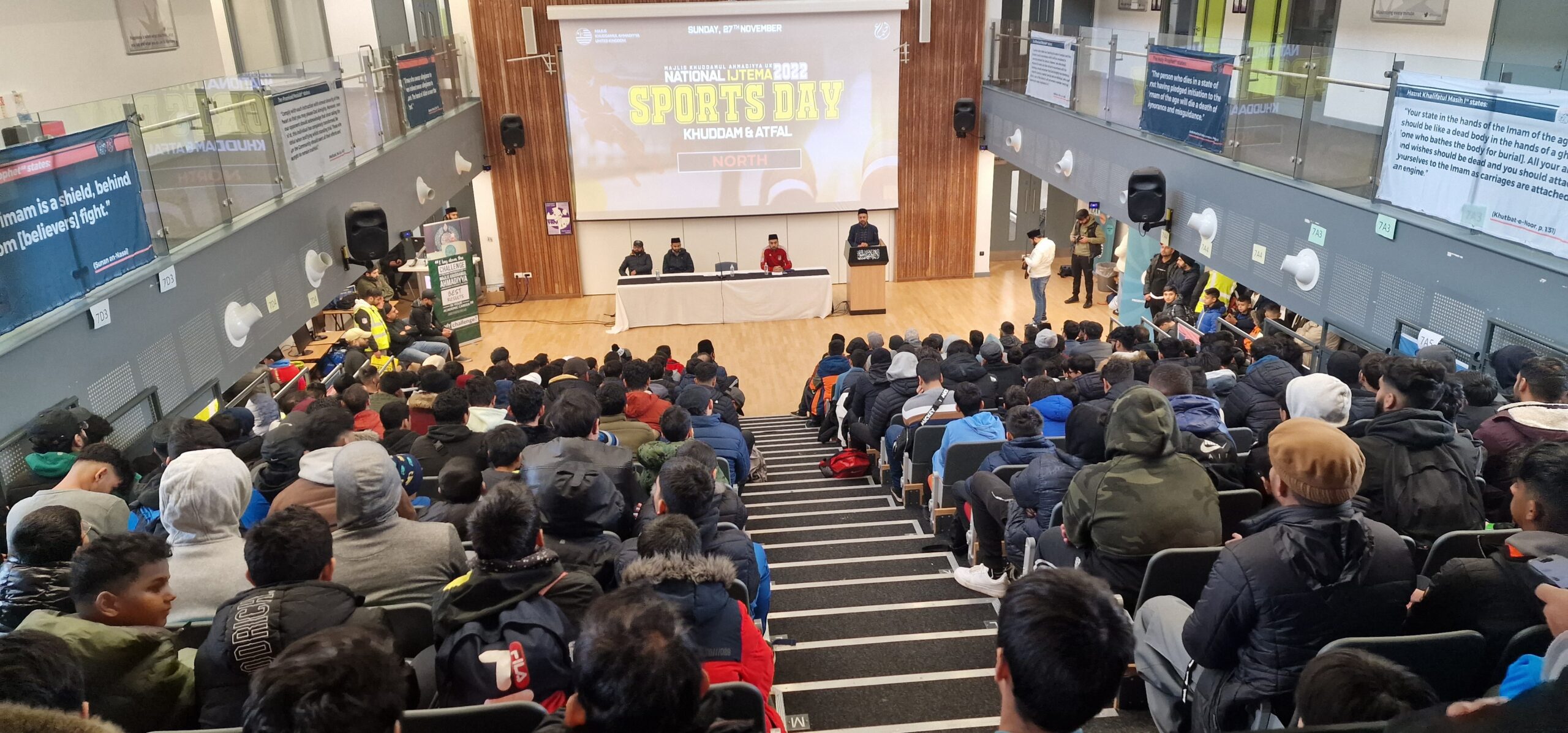
The National Ijtema Sports day for Northern Regions is currently underway in Bradford at Dixons Allerton Academy, and the Khuddam and Atfal present here are thoroughly enjoying all the activities and sessions that are taking place.
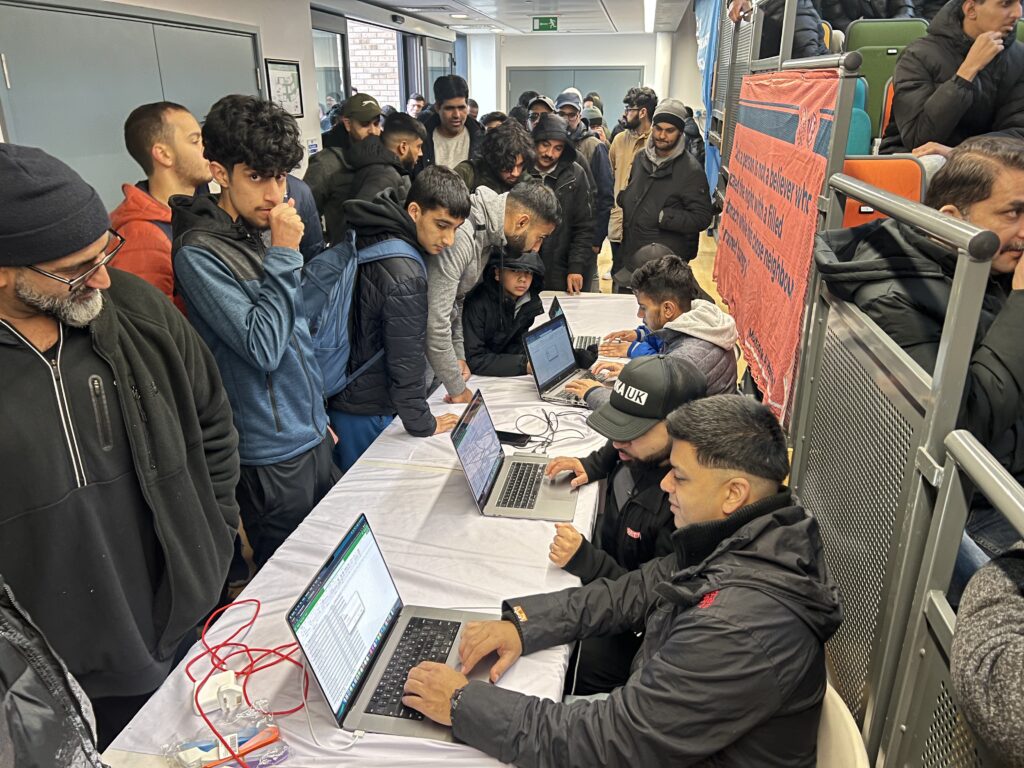
Majlis Khuddamul Ahmadiyya UK is holding this sports day on the instructions of Huzooraba after sports at the National Ijtema 2022 were cancelled due to the demise of Her Majesty Queen Elizabeth II as a mark of respect. Huzooraba instructed the Majlis that the sports that were due to take place at the Ijtema should be organised as soon as possible for the benefit of all Khuddam and Atfal that missed out. Subsequently, it was decided for the Majlis to hold 2 sports days – one for the northern regions (taking place today) and another for the southern regions (date to be announced).
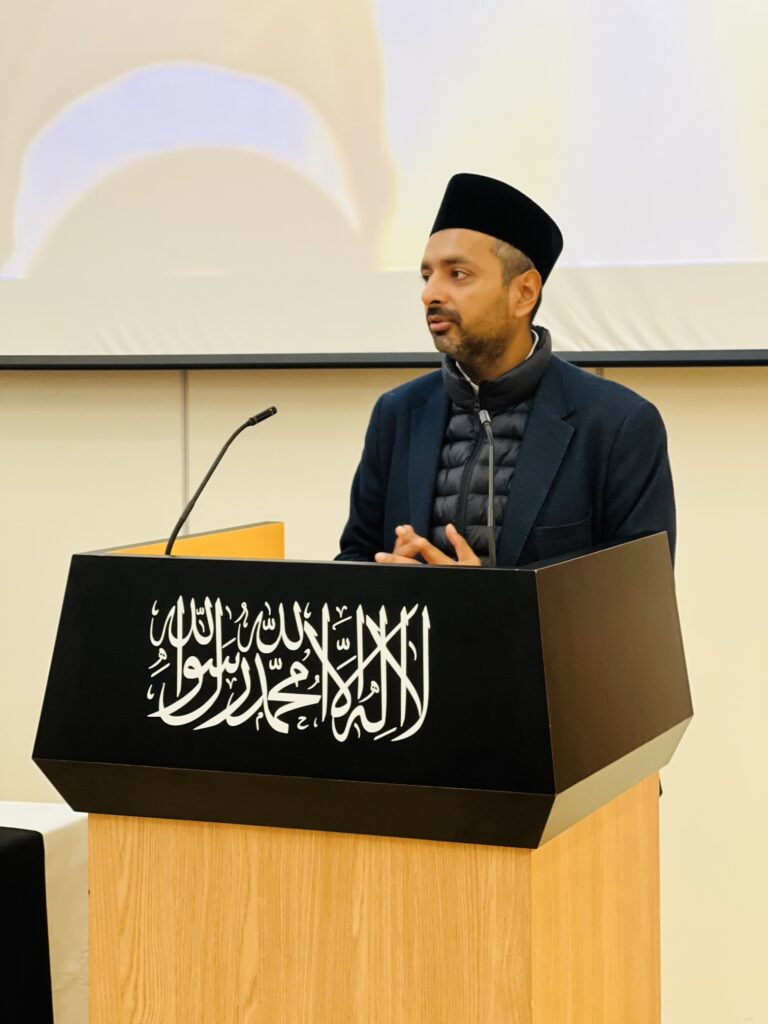

Registration started at 8am with Khuddam and Atfal arriving from all around the northern parts of the UK with breakfast served in the marquees set up onsite. The event started at 10am with an opening session chaired by the Nazime Ala Sahib Ijtema, Tariq Hayat Sahib. The plan for the day was announced by Mohtamim Sahib Sehate-Jismani, Abdur Rauf Lodhi Sahib.
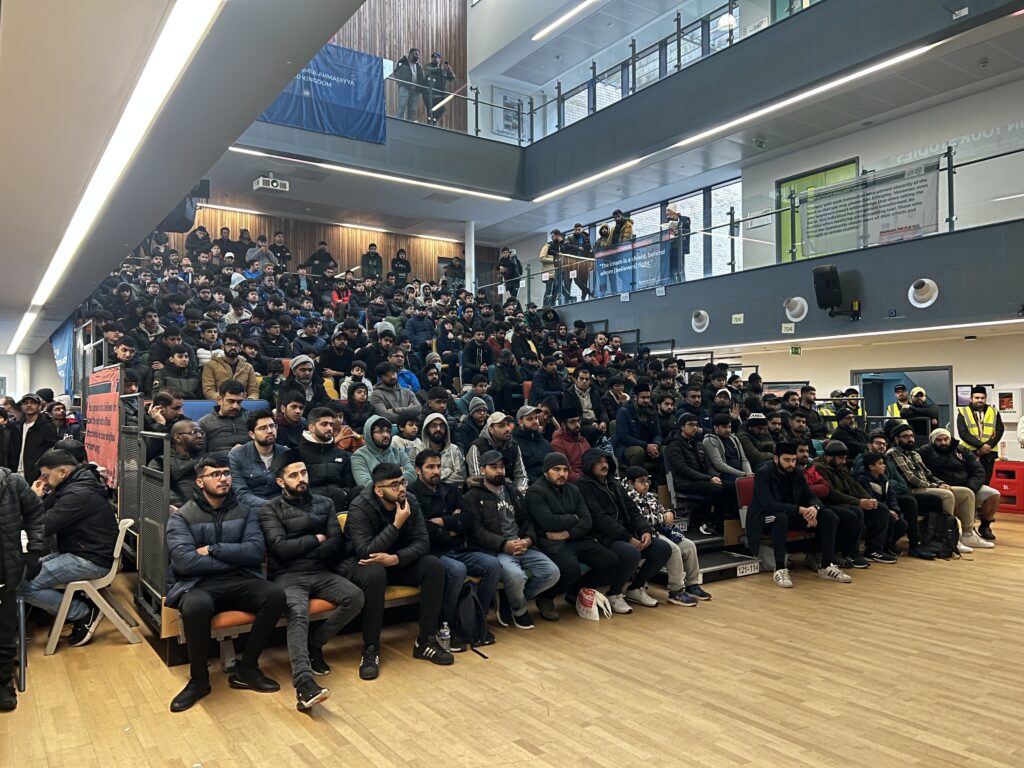
Football and Cricket for Khuddam and Atfal took place in grass fields and netball courts. Tarbiyyat ‘Chit Chat Chai’ were held at the auditorium, alongside outdoor and indoor sports, on topics such as relationships, the key to paradise, and working hard or hardly working. The first talk covered a wide range of questions in relation to how Khuddam should approach the idea of getting married, how to decide on the type of spouse that they desire, the qualities they should look for and the attitude they adopt going into the process.
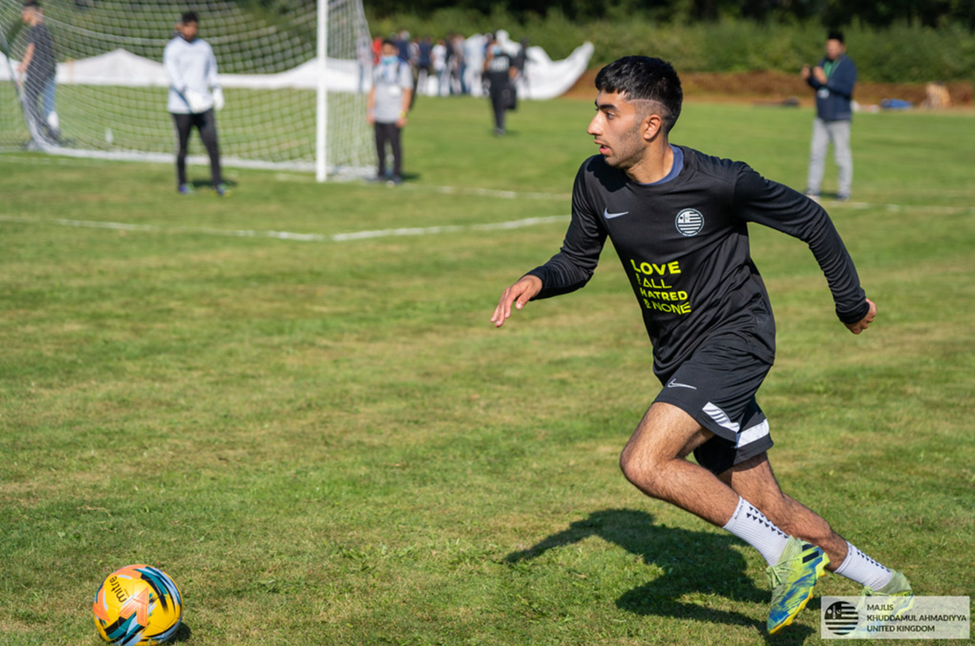
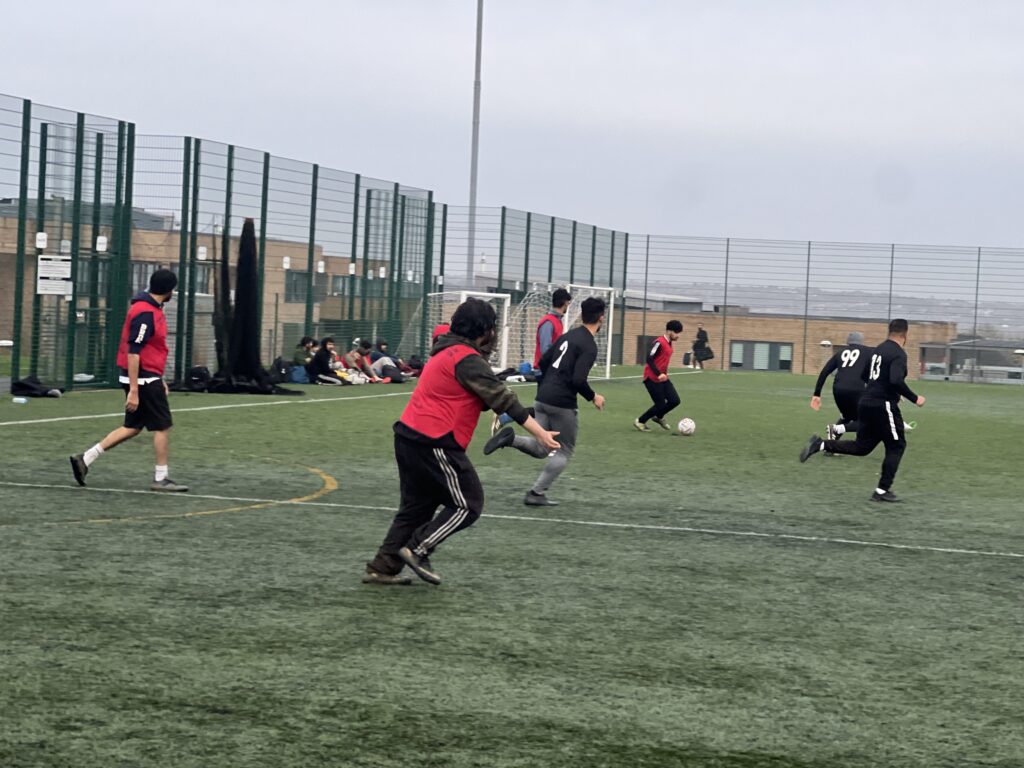
After Namaz-e-Zuhr and Ask a short Talqeen-e-Amal session took place which was on the topic of Namaz. This was followed by a continuation of sports. So far Khuddam and Atfal are finding this it to be a good opportunity to begin the year with an activity that binds the Majlis together in a spirit of brotherhood. The final session is due to take place after Maghrib Namaz, where winning teams will be given prizes by Sadr Majlis Khuddamul Ahmadiyya. The Khuddam and Atfal attendance at the Sports Day is 780, Alhamdulillah.
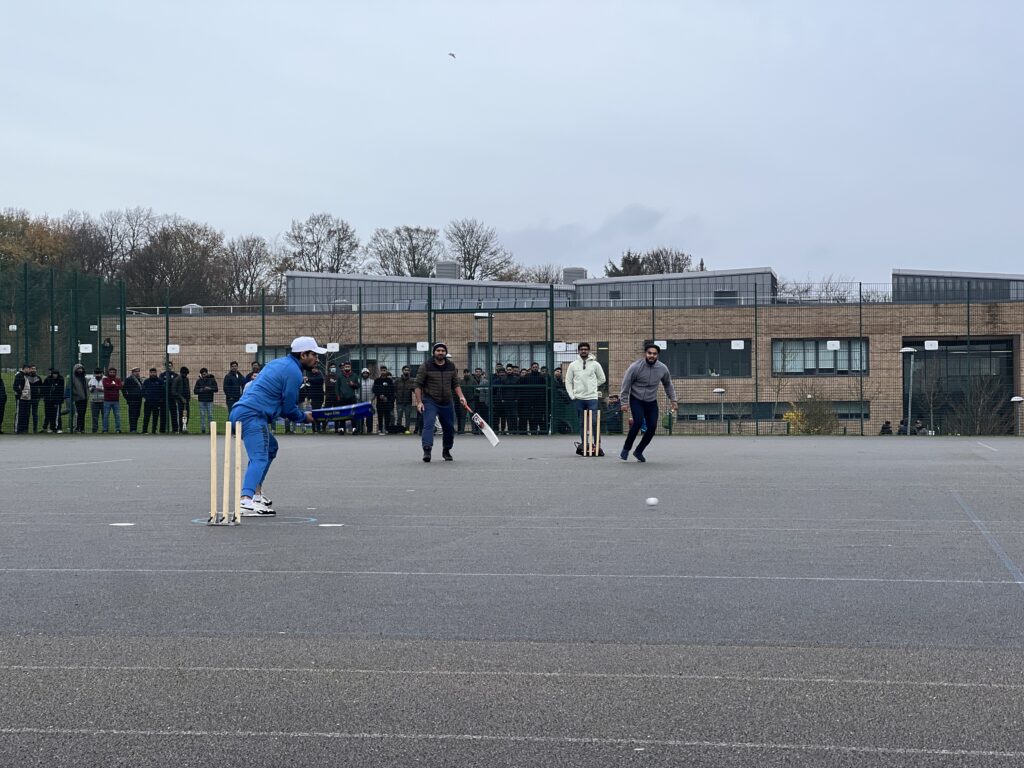
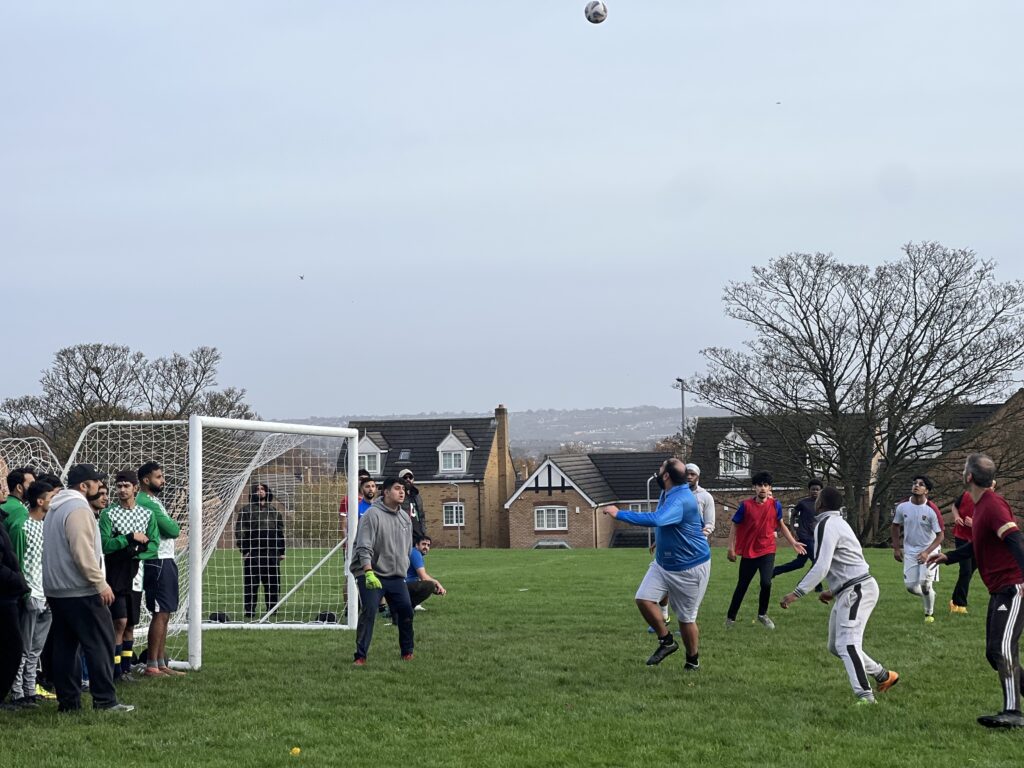
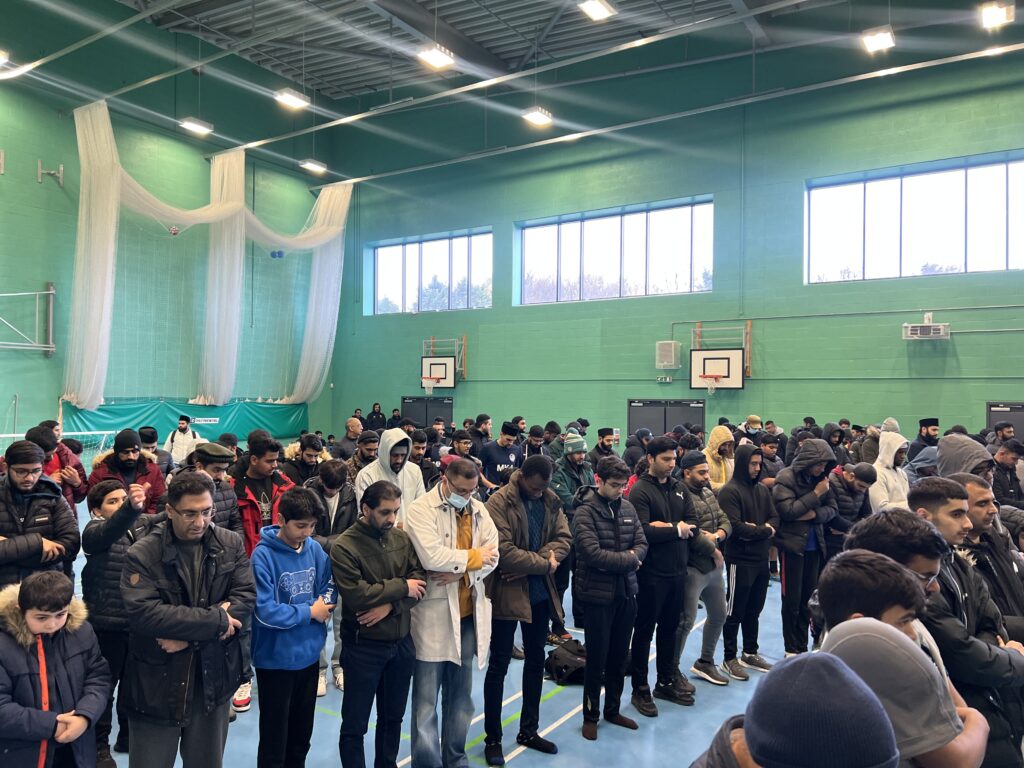
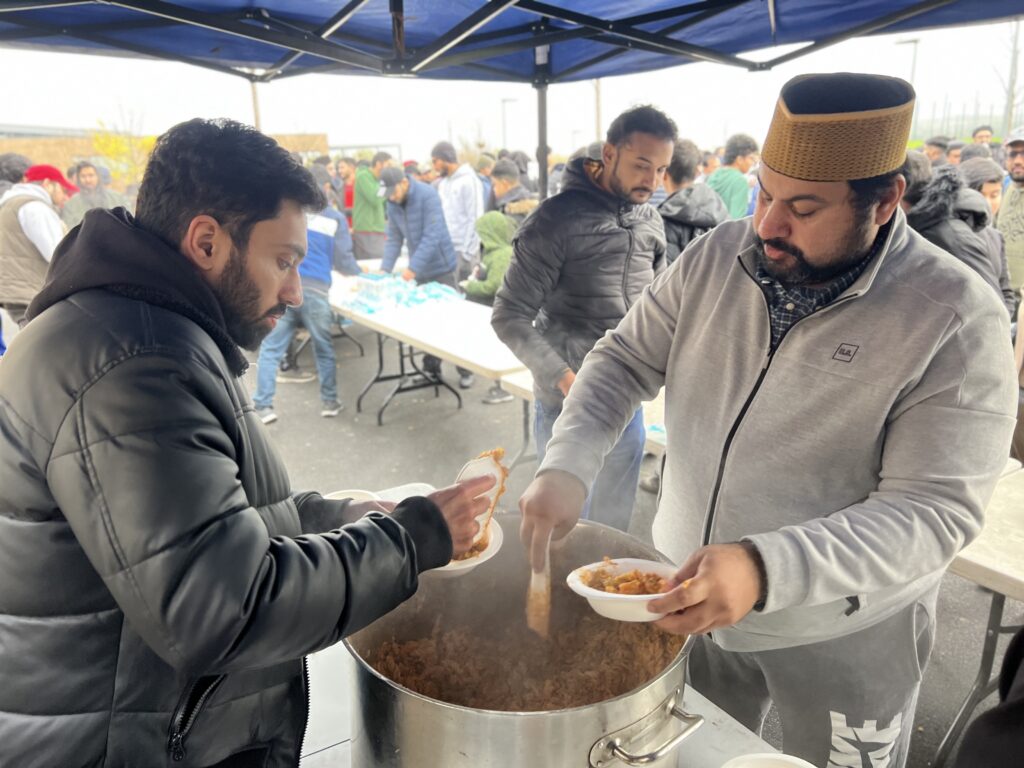
Here is some of the feedback from the Khuddam on today’s event.
A Khadim form North West, Abdul Ghalib Sahib, said that “The event has been really good so far, I enjoyed coming together with Khuddam again after the sports were previously cancelled at the Ijtema due to the demise of the Queen”. Another khadim, Waheed Ahmad, said that “It was good that Majlis has found a window to hold such an important event of the Khuddam year”. Another khadim from Scotland said that “It is important for Ahmadi youth to come together, build a sense of togetherness and develop brotherhood.”
-

 Ijtema2 months ago
Ijtema2 months agoOur Paradise lies in our God. Understanding the Theme of the Year
-

 News2 months ago
News2 months agoA Fresh Start: Serving God and Community in the New Year
-

 News2 months ago
News2 months agoCalling to the Way of Allah with wisdom – MKA West Midlands Tabligh Waqf-e-Arzi
-

 Editorial1 month ago
Editorial1 month agoCondition 2 of Bai‘at
-
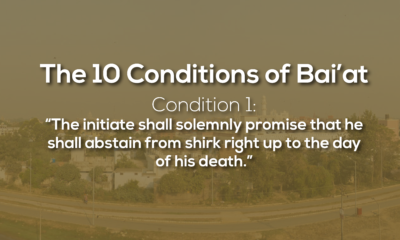
 Editorial2 months ago
Editorial2 months agoConditions of Bai’at: Condition 1, abstaining from Shirk
-
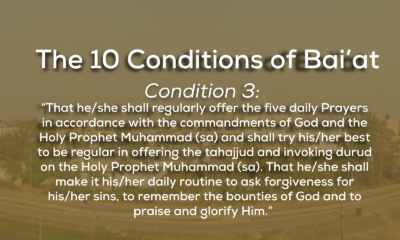
 Editorial1 month ago
Editorial1 month agoCondition 3 of Bai‘at: Offering Prayers & Durood
-
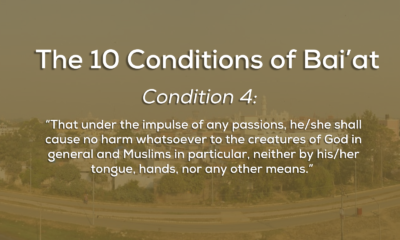
 Editorial2 weeks ago
Editorial2 weeks agoConditions of Bai’at: Condition 4, cause no harm
